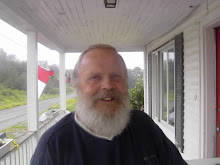Saying "No" to the President
To say "No" to the President of the United States must be a very difficult thing to do. The Democratic controlled Congress has just failed to do so in spite of wide spread public opinion that the War in Iraq should be abandoned as a lost cause, a failed, ill conceived adventure.
Jean Chretien, when he was Prime Minister of Canada, found the courage to say "No" to Canada joining in in the Iraq War in spite of the pressure of "you are either with us or against us". As the US's best friend and economic partner Canada was expected to stand by the US even if the war was illegal and immoral. "That is what friends do." according to Ambassador Paul Cerrutti. Well, the answer was still "No" and for Chretien it may be the one thing he will be remembered for in a long career in government. He has already said it is the thing of which he is most proud.
Recently, we were apprised of such courage by James B. Comey as he gave testimony of an incident when he was temporarily Attorney General when Ashcroft was ill in the hospital. As the story goes Mrs Ashcroft was called by the President and told that Alberto Gonzalez and Andrew Card were coming over the get John Ashcroft to sign a document over her objection that her husband should not be disturbed. Comey got wind of this and showed up. He was fulfiling to duties of the Attorney General while Ashcroft was ill.. Gonzales and Card tried to get the sedated incapacitated Ashcroft to sign an approval for the illegal wiretapping program. To his credit he said "No" and it was Comey's responsibility to carry out the duties of the Attorney General. Comey said "No" and threatened to resign. It appears he is a man of high principle and a respecter of the law. As a result the the wiretap program was modified
.Worse Than Watergate, Part II - CommonDreams.org - Breaking News & Views for t
(This article is an interesting account of the incident)
This act of defiance reminded me of Elliot Richardson's similar declaration of "No" to the President. Richard Nixon had called him to the Oval office and told him to fire the special prosecutor, Archibald Cox, investigating Watergate. Elliot Richardson said "No" and immediately resigned. His Assistant William Ruchelshaus likewise said "No" and resigned. Finally, Robert Borg reluctantly did the deed.Elliot Richardson, Watergate Hero, Dies, 79 [December 31, 1999] This came to be known as the Saturaday Night massacre.
I was privileged to know Elliot Richardson a little, (enough to chat over coffee and pecan pie at a church function) . He was active in the historic First Church of Boston (Unitarian) in those days. While active in government he even managed to teach some Sunday school. He was a Boston Brahmin and a man of great charm and integrity. He would have made a wonderful President.
Elliot Richardson - Wikipedia, the free encyclopedia (Richardson had a distinquished career in and out of government.)
These incidents of courage in the face of power are few and far between. They are worth noting and honouring. Perhaps, there will be another chance for the US Congress to find the courage to say, "No" to President Bush. He has had his way far too long all ready to everyone's detriment.

![[thinkingblogger.jpg]](https://blogger.googleusercontent.com/img/b/R29vZ2xl/AVvXsEhd9OJMeQzSRU2nO1UwIYEiYq7Fy8kqyJou32tkxFyT5DF7GZKLPBVzTtUsTFfGkc6_eQomd-V7nrSg-JEGTRZS378_-eJNQsvb0GIC23MStmn9e0sFTlq_xZ4ZID58dzqFKGXb/s1600/thinkingblogger.jpg)










 Add The Indicator To Your Site
Add The Indicator To Your Site

 Free Typing Tutor
Free Typing Tutor
2 Comments:
I'm glad Chretien said, "No," but was disappointed that he wasn't clear from the beginning. Seems to me Martin did a similar thing.
It wouldn't be Canadian of me to let you get away with hoisting Chretien onto the heroes' platform along with the rest of luminaries you have mentioned. Canada committed to the Afghan mission with the full knowledge that the U.S. knew that we did not have a sufficiently large military capacity to fight on two fronts, so that made it easy to say no. Indeed, in his recent book, "Whose war is it?", historian Jack Granastein says that Chretien's decision had more to do with helping Charest defeat the PQ in a Quebec election rather than a matter of national principle. In my opinion, it was astonishing that he would hitch Canada's foreign policy to a decision of the U.N. Security Council. Granastein feels much the same way.
Post a Comment
<< Home